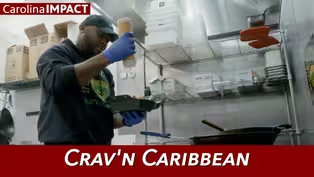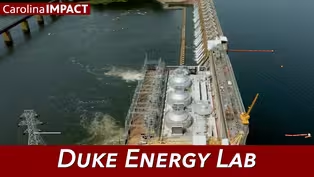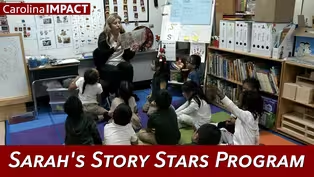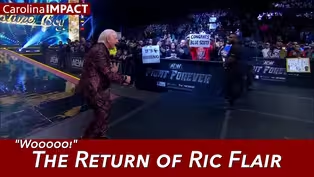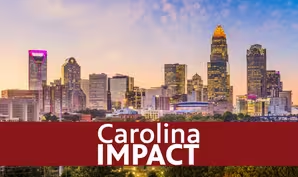
Carolina Impact: January 30th, 2024
Season 11 Episode 1113 | 26m 55sVideo has Closed Captions
The Return of Ric Flair, Crav'n Caribbean, Duke Energy Lab, & Sarah's Story Stars Program.
"Wooooo!" - The Return of Ric Flair and how his stardom helped put Charlotte on the map, a local chef is sharing his Jamaican roots with the Queen City: one plate at a time, a behind the scenes look at the Duke Energy Lab, & PBS Charlotte's "Story Stars with Sarah" teaches pre schoolers the fundamentals of reading.
Problems playing video? | Closed Captioning Feedback
Problems playing video? | Closed Captioning Feedback
Carolina Impact is a local public television program presented by PBS Charlotte

Carolina Impact: January 30th, 2024
Season 11 Episode 1113 | 26m 55sVideo has Closed Captions
"Wooooo!" - The Return of Ric Flair and how his stardom helped put Charlotte on the map, a local chef is sharing his Jamaican roots with the Queen City: one plate at a time, a behind the scenes look at the Duke Energy Lab, & PBS Charlotte's "Story Stars with Sarah" teaches pre schoolers the fundamentals of reading.
Problems playing video? | Closed Captioning Feedback
How to Watch Carolina Impact
Carolina Impact is available to stream on pbs.org and the free PBS App, available on iPhone, Apple TV, Android TV, Android smartphones, Amazon Fire TV, Amazon Fire Tablet, Roku, Samsung Smart TV, and Vizio.
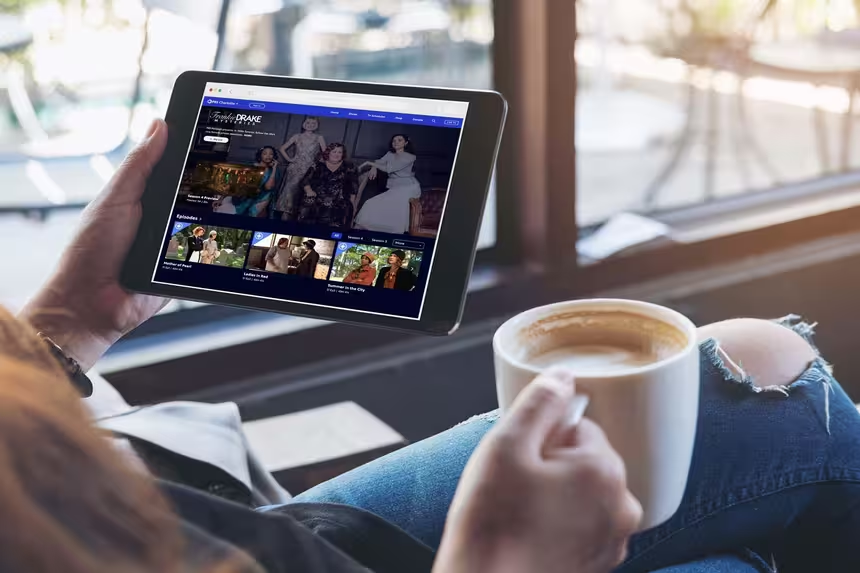
Introducing PBS Charlotte Passport
Now you can stream more of your favorite PBS shows including Masterpiece, NOVA, Nature, Great British Baking Show and many more — online and in the PBS Video app.Providing Support for PBS.org
Learn Moreabout PBS online sponsorship(upbeat music) - [Announcer] This is a production of PBS Charlotte.
- Just ahead on "Carolina Impact", - The Nature Boy, Ric Flair back here at the Charlotte Coliseum, talking about his 50 year wrestling history, paving the way for Charlotte sports and entertainment today.
- [Announcer] History of Charlotte... - [Jeff] It's the interview you'll see only on PBS Charlotte.
- [Amy] Plus, one man brings his passion for cooking all the way from Jamaica to the Queen City.
We show you his spin on classic dishes.
And we'll take you to school to see the impact a PBS Charlotte team member makes on preschoolers.
"Carolina Impact" starts right now.
(upbeat music) Good evening thanks so much for joining us.
I'm Amy Burkett.
Not everybody's a pro wrestling fan, but chances are, even if you're not, you've probably heard of Ric Flair, especially here in Charlotte.
The wrestling superstar lived here and performed here for decades.
And now Ric Flair is back talking exclusively with, Carolina Impact's, Jeff Sonier and videographer Max Arnold about how the history of wrestling in Charlotte transformed us into the Sports and Entertainment Center we are today.
- Yeah, we're here at Bojangles Coliseum, Charlotte's original Coliseum.
And long before the Hornets or the Panthers showed up, before Spectrum Center or Bank of America Stadium were raised up, well this is where the Carolinas came to be entertained.
♪ Welcome back my friends ♪ To the show that never ends ♪ We're so glad you could attend ♪ ♪ Come inside, come inside - [Jeff] The Coliseum Dome has been home to pop singers and presidential candidates, lion tamers and Hall of Famers.
- [Announcer] Mike Jordan with his first rebound ever.
- [Jeff] Michael Jordan played here.
(crowd singing) - I'm proud of this city.
I love this great state of North Carolina.
- [Jeff] Billy Graham prayed here.
♪ Lord Almighty ♪ I feel my temperature rising ♪ Yeah Elvis's hips even swayed here.
But since 1974, well, you'll find this Coliseum's real king here in the ring.
- [Announcer] The heavyweight champion of the world from Charlotte, North Carolina.
222 pounds, Nature Boy, Ric Flair!
(horns blaring) - [Jeff] And now on another Saturday night, 50 years after his first Charlotte fight, - [Announcer] Ladies and gentlemen, the Nature Boy, Ric Flair!
- [Jeff] It's the return of Charlotte's most famous wrestler and that combination of sport and spectacle that Ric Flair made famous.
- [Announcer] But he walks back in to a heroes welcome here.
- [Announcer 2] You go back in time, you look at the history of Charlotte and of Greensboro and Atlanta and all the great cities, Ric Flair's name is at the top of the list.
Oh, what a night this is gonna be!
- [Jeff] But three hours before his triumphant return to the ring here in Charlotte, Ric Flair's on the phone with his wife, Wendy.
- [Wendy] Whatcha doing?
- There's Wendy.
- [Jeff] Hi.
- They wanted to know what it's like living with me?
(laughs) - [Jeff] That was great.
Yeah, no comment.
(Ric continues laughing) - Let me- - I said that.
- Let me call you back later, I'm doing an interview.
- Have fun.
- I hope.
Bye.
- [Jeff] Yep.
Welcome to the Ric Flair interview, a five decade flashback from the Nature Boy himself, on what wrestling here in Charlotte used to.
- [Announcer] This being Flair's very first match, it's amazing that it didn't give him a total distaste for the sport of professional wrestling.
I think I would've taken up golf or baseball or something.
I really would've.
- [Jeff] Ric Flair in the early days wasn't the Nature Boy or the world champion, at least not yet, but soon came the sunglasses, and the platinum hair.
Flair, realizing he didn't wanna be like every other wrestler, Flair wanted more.
- You got Mr. Charisma, Mr.
Excitement, Ric Flair, and you know who I got in my mind, I got the boy!
And the guys for years, just all they wore was Zumba pants and I mean, put on a wrestling outfit and that was it.
I put a lot of thought into mine.
- [Jeff] Yeah.
You brought a sense of style, a sense of presence.
- Yeah.
- I mean showmanship's the word.
- Yeah, I felt like that I owed it to the business.
- [Jeff] And Flair says that early showmanship was good for business too.
Not just making him a star, but also making Charlotte Pro Wrestling a hit.
(crowd cheering) This is Japanese TV coverage of a Charlotte Coliseum match in the 1980s, when there were big wrestling crowds, not just here in Charlotte, but all over the Southeast and the Midwest.
With Flair's fellow Charlotte-based wrestlers all following his flamboyant lead.
(bell dings) - The fans here were rabid, man, I mean, Mulligan, Steamboat, Ricky Morton, Magnum, Nikita Koloff, Ivan, my God I can't remember the guy's, Wahoo McDaniel, Paul Jones, the Andersons.
I mean, we sold out every night.
- [Jeff] And most of them lived right here in Charlotte.
- [Ric] Everybody did, yep.
There was no Panthers, there was no Bobcats, no Hornets.
We ran it.
We ran the town.
- [Jeff] In fact, back in the eighties when Flair first moved here, he actually predicted the kind of success that wrestling would bring to him and to Charlotte.
- We do as much business in terms of people and sports dollars as any other sport.
- It was a great experience to see not only the sporting events, but the concerts and the family shows and everything else.
- [Jeff] George Hite is the retired general manager of Bojangles Coliseum who started as a Coliseum usher in his teen years.
Later he oversaw the Coliseum's renovation back in 2016 and Hite says, those old Coliseum wrestling matches are part of what put Charlotte on the map.
- A lot of times Charlotte was probably that only stop between Atlanta and Washington, but because of the building's history and all the things that they brought to the market, a lot of shows made their stop here in Charlotte.
- [Jeff] And eventually so did the NBA and the NFL.
How much does Charlotte today owe to wrestling when it comes to pro sports?
- Everything.
- [Jeff] David Crockett sits surrounded by wrestling memorabilia from his family's sports promotion business.
It was the Crocketts who first brought wrestling to Charlotte and ran wrestling from Charlotte.
- Wrestling, of all the entertainment that we had, it was the one that stayed constant.
You watch TV ratings or you watch the turn stop and there was this thing about Charlotte not being a sports city, professional sports, and yes it is.
You just have to present them the right thing, present it to where they want to come.
- [Jeff] And that's why the Crocketts also brought Ric Flair to Charlotte.
- You know why?
Because I'm the champ.
I'm the world heavyweight wrestling champion!
- The camera loved him.
It's that special something that you cannot teach.
They have to have it.
- He is a real big dude!
But he's not the champ.
Ric Flair's the champ.
Understand?!
- [Producer] How'd you stay on top for so long?
- I was that good.
I'm not gonna lie about that.
(laughs) - [Announcer] Like Elvis Presley played here in this building in 1959... - [Jeff] And on this Saturday in Charlotte, everything old is new again because 50 years later for these fans, Ric Flair is still the man.
- [Jeff] Do you ever put on a ball cap, throw a hood up and just kind of sneak out and not get recognized?
- No.
- Is that impossible?
- That that wouldn't be any fun.
(laughs) Why would I wanna do that?
- [Jeff] Yeah, you've been in the spotlight this long, the spotlight kind of old.
- [Ric] I'm gonna stay in it...as long as I can.
- [Jeff] You're not slowing down, are you?
- [Ric] No, not a chance.
- [Announcer] Fans at ringside getting lifelong moments.
- [Audience Member] Whoo!
- Whoo!
- [Jeff] How often do people come up to you and say, "Just go ahead and do the whoo?"
- Every day, thank God.
- (Jeff laughs) Well, I can't let you go without asking too.
- Whoo!
- (laughs) And Ric Flair will be back in North Carolina soon this time in Greensboro, another return to the ring and another old coliseum where Flair, even though he is now in his seventies, will still be what he's always been here in the Carolinas, The nature boy.
Amy?
- Thank you so much, Jeff.
If you're looking for more on Ric Flair then and now, check out our website, PBScharlotte.org.
We'll link you to the entire video of Flair's return to the Coliseum, and you can also watch that TV interview with him back in the early eighties when Flair first moved to our region.
Well, next up we've got a spicy business story for you.
What began as a childhood pastime in Jamaica is now the bread and butter for one local man.
Cooking has always been a part of Carlos Abrahams' life and he's thrilled that he gets to share that passion with customers at his Charlotte restaurant.
Carolina Impact's Dara Khaalid and videographer, Russ Hunsinger show us how he's putting a spin on Jamaican food.
(Caribbean music) - [Dara] Walking quickly with a bag full of freshly prepared Jamaican food, Carlos Abrahams heads to the window to service customers.
- Is there anyone here to pick up a Caribbean?
- [Dara] Before the boxes stuffed with food make it to the window, there's a detailed process happening in the kitchen.
Like cracking eggs into a sizzling wok of peppers, chopping cilantro, and cooking shrimp with extra heat.
- It's fun.
I'm always looking forward to what the customer's reaction is gonna be.
- [Host] Abrahams opened the doors of his restaurant, Crav'n Caribbean in 2021, but the journey getting there started at his home the year before.
- I would prep until midnight, get back up at like three in the morning, leave the house by maybe like seven o'clock, and I would drive around to different businesses and sell plates.
And then it kind of just kept on taking off from there until I had enough people to where they were like, "Man, you need a location."
- [Host] He tells me this decision required a leap of faith because it was vastly different from his previous careers as a US Marine and car salesman.
However, he couldn't ignore his passion for cooking.
In fact, it was something he'd been doing since he was a child in Kingston, Jamaica.
- I grew up watching my mom cook.
She actually had a restaurant in Jamaica at the time, so just watching her always out of me and my brothers, I was one of the ones that was always cooking.
- [Host] Abraham says, growing up in Jamaica, most of their food was homegrown.
His family had fruit trees in their backyard and hardly ate out at restaurants because they lived off the land.
So in the early 2000s when they moved to the US and settled in a Delaware neighborhood, it was quite the adjustment.
- It was also just finding what was most cost beneficial at the time because we just didn't really have much.
So she just made things work.
And we've also learned a lot of like not making things go to waste.
So my mom would remix a lot of meals.
- [Host] Little did Abrahams know at the time, but that same concept of remixing food will be something he'd do in his own restaurant one day with fusion dishes.
- Fusion is basically taking two different cultures and merging it together.
So if you have someone that's Mexican and someone that's Jamaican, you can take something that's from both cultures and make it into one.
- [Host] Crav'n Caribbean has several fusion options, like its popular oxtail cheese steaks.
They even have a section on the menu called Jibachi, which is the mix of Jamaican and Hibachi food.
- It seems unorthodox, but if people actually know true Jamaican history, there's a huge Asian population.
So when we introduce like the oxtail fried rice, people thought like, "What is this?"
- And one of the things we make sure our customers get good portions, so they're getting their money's worth.
- [Host] Chef and restaurant manager, Alexander Keopraseuth says he and Abrahams didn't let the naysayers discourage them.
Instead, they found more creative ways to bring their cultures together and add to the menu.
- If the customers love it, which is the most important thing, we're gonna continue doing that and we're just having fun and loving it along the way.
- [Host] As they continue serving up food like sweet potato yams and mac and cheese, customers like Danielle Ellis tell us they'll continue coming back.
- You just feel like it's your grandma's back there putting her foot in that food.
You know every time you come it's never gonna be a fail.
- [Host] Ellis was born and raised in the Queen city and remembers a time when the food scene wasn't as diverse.
- Charlotte came a long way.
We didn't always have those options.
I'm for supporting the culture and supporting entrepreneurs.
So I love of course the Chick-fil-A and the McDonald's, but anytime that I have the time or I have the funds to spare, I do like to support entrepreneurs.
- [Host] For entrepreneurs like Abrahams, support from customers doesn't just impact him but his family too.
- It's fun getting to watch him cook the things that I would cook when I was a kid, especially for my mom.
And also getting him to learn the side of the business and seeing like physically like what your dad does every day for a living.
- I love making plates.
- [Host] And with the next generation in his bloodline falling in love with cooking, Abrahams is proud to know his spatula will be in good hands.
For "Carolina Impact", I'm Dara Khaalid.
- Thank you, Dara.
Abrahams tells us at first he was hesitant about having his son in the kitchen, but Carlos Jr. has proven he can handle the heat.
The two tell us they look forward to more bonding over their shared passion.
Well, as our region continues to grow, so will the demand for electricity, Duke Energy officials project in the next seven to 10 years, their customer's demand for electricity will increase about 33%.
A smart energy grid, renewable resources, home generators, storage batteries, and even electric vehicles could be solutions to help meet the demand.
How all of these pieces work together is a concept called, "energy orchestration" and that's where the Duke Energy Mount Holly Emerging Technology office comes into play.
Producer Russ Hunsinger takes us inside this lab where new technologies that produce, store and access energy are tested.
- [Tom] Basically what we've built here at this site is a bit of a microcosm of what the Duke Energy grid and our customer's experience may look like in the future.
(upbeat music) We have electric vehicles, we have thermostats in customer's homes.
Some customers are adopting battery technology as a backup system for their home in case of an outage.
We have more and more digital operated devices on the electric grid and our job as the emerging technology office is to explore that concept of how do we make all of these devices interact together in a seamless way so that we can increase the reliability of the electricity going to the customer, but also maximize the usage of the assets that we have?
We really would like not to have to build large generating plants.
And if we can maximize what we have available today and make that the most effective use of that possible, that really needs to be the first thing that we do for our customers.
And we're actively involved in testing that and actually setting up test scenarios here to prove out that concept so that when we do get to the grid, to the larger electric grid, that our customers are fed from in a couple of years, we actually truly understand what it's like to operate all of that.
The latest technology system that we've deployed here at the Mount Holly Innovation Center is our GKN Hydrogen battery.
The industry is actively exploring hydrogen and how we can use hydrogen as a potential energy source in the future.
What you see behind me is a Generac home energy storage system.
So as customers install more solar power on their roofs during the day, the battery gives them the opportunity to store that solar energy and then release it at night or use it for backup services in place of a generator.
We have days during the summer where we have congestion on the grid, we have a peak situation and instead of us actually starting another fossil fired power plant, we go out and ask for our customers to give us access to that battery and then allow that battery to power their home for a period of time and incentivize that customer through a payment to have access to that asset so that we can use it for the benefit of the customer and us.
Outside, we have a Ford F-150 vehicle to grid and we're trying to understand how can concepts like using the battery in a truck not only power the home, but when we need it, can we call on that customer to potentially provide us the electricity that's in that battery to provide services to the grid when we may need it?
- So SPOT is our robotic dog working with Boston Dynamics to augment some of our work practices that we use at our nuclear stations.
Some people are familiar with robotic technology, but actually seeing it be applied and actually something that they can see and touch in real life, they're actually really amazed that there's a company like us who's actually using it.
We actually look at new and innovative technologies to be able to augment how we do business to be more effective.
- This facility has been great for our students.
To be able to come over here to the emerging technologies facility and see what the future looks like, to see how dynamic it is, to see how it's changing and to see what the opportunities are for our students.
It's just, it's the highlight of their semester.
- We envision a future here where we're gonna have a lot of levers, okay, if you wanna simplify it, okay.
I need batteries, I need solar, I need electric vehicle charging.
All of these things are gonna have to be interactive.
As a utility, our number one and number two things that we have to provide to our customers is reliable power and affordable power.
So we want to make sure that everything we do has a focus on that.
- Pretty impressive technology there for sure.
Thanks so much, Russ.
The emerging technology office operates independent of the electric grid; batteries charged by solar power supply the lab's energy needs.
Researchers gain real world experience living with these new technologies.
Well finally tonight, when you think of PBS Charlotte, our high quality content in programs like "Masterpiece" and "NewsHour" probably come to mind first, but we do a lot in nearby Title 1 Schools to help disadvantaged students as well.
Jason Terzis joins us with the details.
- I've been here with the team at PBS Charlotte for more than eight years now and the one thing I always hear Amy say is, "We are here to serve the community."
And that's not just in the programs that we bring our viewers, it's more than that.
It's about education, outreach, and lending a helping hand in our community where it's needed most.
(light music) - Good morning everyone!
I'm so excited to be here with you today.
- [Jason] It's story time for preschoolers at Hidden Valley Elementary.
- I'm so excited!
Do you remember, what do we call our program?
- [Jason] Story Stars with Sarah.
- Can you say Story Stars?
- [Group] Story Stars!
- [Host] Led by PBS Charlotte Education and Outreach coordinator, Sarah Woldum.
- Say "I'm a Story Star!"
- [Group] I'm a Story Star!
- I'm a Story Star!
- I'm a Story Star!
- Yes!
- [Host] Before getting to the story of the day, Sarah leads the kids through some fun voice exercises to get those vocal chords ready.
- [Sarah] Open, shut them, give a little quack, quack, quack!
- [Host] She's a natural in the classroom and there's good reason for that.
- I taught for about seven years and I taught toddlers, so like 15 months to three years old and it was a Montessori program.
This book is called "We Are Different, We Are the Same, and We're All Wonderful," so I'm gonna need your help while I read this story.
- [Host] Engaging the kids and keeping them involved, Sarah frequently stops to ask them questions along the way.
- This person looks happy, they have a burger.
How do you feel?
How do you feel?
- So like the story they did today, we actually have been talking about feelings.
So that actually related back to what we actually have been learning about how people have different feelings and it's okay to have a different feeling.
- I think one of the things I was the most worried about is getting over kids being really shy around me or something, but that has not been a problem.
They're all so excited to be a part of it and they all wanna answer questions.
They wanna be part of activities, they wanna participate, which is really fun.
Our skin is different.
Our skin is the same.
It tells us something's cold or hot or wet or dry.
It knows a lot.
- [Host] The Story Stars program was designed to get preschoolers excited about reading and learning because as studies has shown time and time again, kids that know how to read at a young age are set up for later success in school.
- I can't emphasize the importance of the fundamentals of learning how to read while you are in pre-K. Students' literacy skills is basically a great determinant on how they're gonna succeed in life.
And so for PBS to continue their partnership and use characters that the students are aware of via what they watch on TV and Sesame Street, it just further draws them in to this great program that PBS is doing with literacy now.
- If you go outside today and you don't have a coat on, your skin will tell you it's cold!
Go put a coat on!
- [Host] And having a different voice in the classroom keeps kids engaged.
Giving teachers like Allyson Armstrong a little break in their busy day.
- When I told them yesterday that Miss Sarah was coming back, they were like, "Oh, miss Sarah.
Yeah!"
So they really look forward to her coming in because she brings different things that we may not have given to the students yet.
- And they're not just sending volunteers out here.
These are trained professionals that PBS send out here to work with our students.
So it's a dual experience in which the students learn, but also our teachers get to see other techniques on delivering literacy content to their students.
So a lot of times they'll take that content that they use, that they saw from PBS and they'll implement it within their lessons going forward.
So it's been a win-win for both.
- [Host] The Story Stars program is also taking place at University Meadows Elementary.
Between the two schools, Sarah is working with eight preschool classes, over 160 students total.
She's also doing a version of the program for PBS Charlotte's YouTube channel.
The program was all made possible by the Corporation for Public Broadcasting.
PBS Charlotte was thrilled to be awarded a two year grant to fund and support the initiative.
- That grant, they wanted it focused on children ages two to eight, and they wanted it focused on computational thinking, everyday literacy, and the world of work, like early career awareness.
Part of the grant process was going into the community and talking with people and finding out what they want and what programs are already out there and how we can build on those programs.
Or maybe there is a gap that we can fill.
Our bodies are the same.
They stretch and bend and work and play.
They all need food and rest each day.
- [Host] And this isn't the first time a grant has allowed PBS Charlotte to assist in early childhood education.
The Creative Coders program taught kids the basics of coding all while having fun.
- Once again, I want to thank PBS for our over three year partnership that we've had here at Hidden Valley Elementary School working with our pre-K students.
The coding program was an absolute success, especially during the Covid shutdown because it gave students, pre-K students, an opportunity to do online work doing coding, - [Host] And you don't need to be in preschool to take advantage of what PBS Charlotte has to offer.
Visit us at wtvi.PBSLearningMedia.org There you'll find hundreds of free digital resources in every academic category, and it's all tied to state academic standards from preschool through to 12th grade.
And did we mention it's free?
- I'm grateful to Jason for sharing that story because often the best kept secret of PBS Charlotte, is all the work that we do in education and we don't want it to be a secret.
We want people to be able to take advantage of these free resources.
- We do.
And even preparing for this story, I was poking around our website, I'm usually looking for our stories or "Caroline Impact" or other things, and all of a sudden I start getting to the education stuff.
I'm like, "Oh wow, I didn't even know half this stuff was here!"
So it is kind of cool that we had that.
Well, we had more than 25,000 users this past year and we'd love for that number to go up.
This is a free resource for teachers, parents, students, really anyone.
If you would like professional development on our PBS learning media resources at your school or daycare, send us an email to education@wtvi.org, education@wtvi.org.
And Sarah or someone in education, we'll get back to you and will help you out.
- Absolutely.
Thanks so much for sharing the story.
Now you know another way PBS Charlotte makes a positive impact across our region.
Well, I wanna thank the students from Francis Bradley Middle School for visiting us today in the studio.
They've done an amazing job, asked some incredible questions, and we're very proud to have them here.
Well, that's all the time we have this evening.
Thanks so much for joining us.
We always appreciate your time and we look forward to seeing you back here again next time on "Carolina Impact".
Goodnight my friends.
(upbeat music) - [Announcer] This is a production of PBS Charlotte.
Video has Closed Captions
Clip: S11 Ep1113 | 4m 27s | A local chef is sharing his Jamaican roots with the Queen City, one plate at a time. (4m 27s)
Video has Closed Captions
Clip: S11 Ep1113 | 4m 9s | The Duke Energy Lab tests technologies that produce, store, and access energy. (4m 9s)
Video has Closed Captions
Clip: S11 Ep1113 | 5m 16s | PBS Charlotte's "Story Stars with Sarah" teaches pre schoolers the fundamentals of reading (5m 16s)
Wooooo! - The Return of Ric Flair
Video has Closed Captions
Clip: S11 Ep1113 | 7m 38s | After 50+ years in the ring, Charlotte's 'Nature Boy' is still 'styling and profiling'. (7m 38s)
Carolina Impact: January 30th, 2024 Preview
Preview: S11 Ep1113 | 30s | The Return of Ric Flair, Crav'n Caribbean, Duke Energy Lab, & Sarah's Story Stars Program. (30s)
Providing Support for PBS.org
Learn Moreabout PBS online sponsorship
- News and Public Affairs

Top journalists deliver compelling original analysis of the hour's headlines.

- News and Public Affairs

FRONTLINE is investigative journalism that questions, explains and changes our world.












Support for PBS provided by:
Carolina Impact is a local public television program presented by PBS Charlotte
